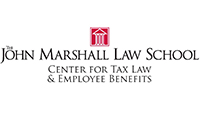
The John Marshall Law School’s 15th Annual Employee Benefits Symposium on April 20, hosted by Winston & Strawn LLP, offered insight on current wellness programs and how employers are embracing them.
In an effort to slow the growth of employees’ medical expenses, more employers have started to embrace wellness programs. But wellness programs come in a variety of shapes and sizes. Navigating through federal laws that affect these programs can be a challenge. To avoid tax implications for employees, the program must comply with certain non-discrimination rules. Non-discrimination rules under the Affordable Care Act (ACA) and the Americans with Disabilities Act (ADA) also may be implicated. In addition, the Health Insurance Portability and Accountability Act (HIPAA) and Title II of the Genetic Information Nondiscrimination Act (GINA) prohibit discrimination against an employee based on adverse health factors and genetic information. Enforcing these rules involve a number of federal agencies—Departments of Health and Human Services, Labor, Treasury/IRS and the Equal Opportunity Employment Commission (EEOC)—that do not coordinate efforts in how these rules apply to wellness programs.
“The Center for Tax Law & Employee Benefits remains cutting edge in our anticipation and investigation of timely employee benefits issues,” said Professor Kathryn Kennedy, Director of John Marshall’s Center for Tax Law & Employee Benefits. “For this symposium, we tackled the issues surrounding wellness programs and what companies need to do to comply with the relevant Acts, as well as best practices for companies to consider.”
The symposium featured speakers from firms such as Nixon Peabody LLP, Seyfarth Shaw LLP and Wintson & Strawn LLP, as well as senior counsel for the McDonald’s Corporation. Experts from across the country discussed various topics, including the regulation of wellness programs under government Acts like HIPAA and the ACA, how the ADA and GINA affect wellness program design and the EEOC’s enforcement relating to wellness programs. The panels were moderated by Professor Kathryn Kennedy, Director of the Center for Tax Law & Employee Benefits, and Will Hansen, a graduate of John Marshall’s Employee Benefits program and Senior Vice President of ERIC.
The Center for Tax Law & Employee Benefits proudly hosts the Annual Employee Benefits Symposium each spring, offering academics and leading practitioners the opportunity to present their works-in-progress on current employee benefits issues and receive feedback before publication. Past topics include “The Changing Landscape of Executive Compensation Regulation and Reporting,” “The Future of Employer-Provided Health Benefits” and “Legal Issues Regarding Public-Sector Employee Benefits Plans.”

